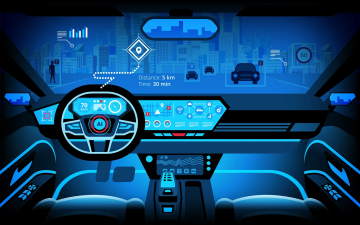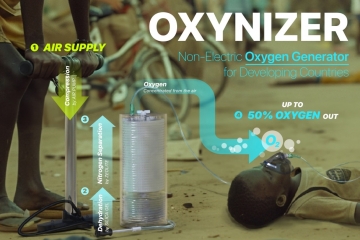KAIST
BREAKTHROUGHS
Research Webzine of the KAIST College of Engineering since 2014
Spring 2025 Vol. 24NUGU: A group-based intervention App that improves self-regulation of limiting smartphone use
NUGU: A group-based intervention App that improves self-regulation of limiting smartphone use
KAIST researchers have developed a mobile app that helps users to limit their smartphone use by leveraging social support.
Article | Spring 2015
The negative aspects of smartphone addiction, such as social conflicts, attention deficits, and sleep deprivation, have received significant attention in recent years. According to a survey by the South Korean government, the smartphone addiction rate of teenagers has been rapidly increasing, from 11.4% in 2011 to 18.4% in 2012 and 25.5% in 2013. The Korean government and Korean research institutes have made substantial efforts to devise effective methods of understanding and mitigating problematic smart media usage.
Prof. Uichin Lee and his colleagues in the department of Knowledge Service Engineering at KAIST are one of the pioneering groups in the world aiming to better understand problematic smartphone usage and to develop intelligent intervention methods by applying computational techniques to this problem domain (e.g., automatic logging and classification, information sharing, and personalized user feedback). This computational approach is very different from the traditional psychology studies that were largely based on subjective user reports.
Initially, Prof. Lee’s team embarked on this endeavor by aiming to systematically analyze how individuals’ perceived smartphone addiction is related to their actual smartphone usage. Towards this goal, they first collected a large-scale usage log dataset from college students and compared between-group usage differences (i.e., risk vs. non-risk group users of smartphone addiction). From this analysis, they were able to find several unique patterns of the risk group users such as longer usage time of their smartphones, more skewed usage of frequently-used apps, and longer usage sessions triggered by incoming notifications. In their follow-up study, they conducted an online survey and interviews to investigate how users deal with problematic smartphone usage. They found that people used various coping mechanisms (e.g., turning off the phone, physical separation), but users’ lack of self-regulation made them less effective. These results were published in 2014 at the ACM CHI conference, which is a premiere conference on Human Computer Interaction (HCI) [1,2].
These findings strongly motivated Prof. Lee’s team to further investigate an effective way of dealing with the negative aspects of smartphone use such as social conflicts and attentional deficits. From the interview data analysis, the team discovered that smartphone usage has both positive and negative aspects, and this makes regulating smartphone usage quite challenging. For this reason, they developed a new approach of leveraging social support to improve self-regulation in limiting smartphone usage. A group of friends limit their smartphone use together and share their limiting information with one another. Prof. Lee said, this approach is based on social cognitive theory (SCT) by Albert Bandura, a renowned psychologist at Stanford University. This theory illustrates that learning occurs in a social context, and much of what is learned is gained through observation. Through social learning, people can have better awareness of normative behaviors and can also be motivated to self-regulate. The theory guided the team to design a group-based intervention app called NUGU (when No Use is Good Use) with key features such as visualizing objective usage/limiting behaviors, setting limiting goals, sharing limiting practices, and reinforcing desirable behaviors.
Their three-week user study (n = 62) demonstrated that the NUGU users’ usage amount significantly decreased and their perceived level of managing disturbances significantly improved when compared with its non-social counterpart. Furthermore, exit interview results showed that NUGU’s design elements were effective for achieving limiting goals. Most participants concurred that reducing their smartphone use was even fun with NUGU, and they were highly motivated by the support group who used the app together. The result will be published in March at CSCW 2015, which is a premier conference on HCI [3]. The team is currently working on designing an interactive tool for parental mediation of teens’ smartphone usage.
[1] U. Lee, J. Lee, M. Ko, C. Lee, Y. Kim, S. Yang, K. Yatani, G. Gweon, K.-M. Chung, and J. Song, “Hooked on Smartphones: An Exploratory Study on Smartphone Overuse among College Students,” ACM SIGCHI Conference on Human Factors in Computing Systems (CHI’14), Toronto, Canada, April 26-May 1, 2014
[2] U. Lee, S. Yang, M. Ko, and J. Lee, “Supporting Temporary Non-Use of Smartphones,” Refusing, Limiting, Departing: Why We Should Study Technology Non-use. (In conjunction with CHI 2014), Toronto, Canada, April 26, 2014
[3] M. Ko, S. Yang, J. Lee, C. Heizmann, J. Jeong, U. Lee, D. Shin, K. Yatani, J. Song, K. Chung, “NUGU: A Group-based Intervention App for Improving Self-Regulation of Limiting Smartphone Use,” The 18th ACM conference on Computer-Supported Cooperative Work and Social Computing (CSCW’15), Vancouver, BC, Canada, March 14-18, 2015
These screenshots show the key features of NUGU: (1) Self-monitoring: to monitor a user’s daily usage and to help reduce the time spent on a smartphone; (2) Goal-setting: to set a goal about how long a user is going to limit smartphone use and for what activity (here, points are awarded if a goal is achieved); and (3) Social Learning & Competition: to learn usage patterns from the other users and to check a user’s rank (here, ranking depends on the cumulated points earned from usage limiting activities).
Most Popular

When and why do graph neural networks become powerful?
Read more
Smart Warnings: LLM-enabled personalized driver assistance
Read more
Extending the lifespan of next-generation lithium metal batteries with water
Read more
Professor Ki-Uk Kyung’s research team develops soft shape-morphing actuator capable of rapid 3D transformations
Read more
Oxynizer: Non-electric oxygen generator for developing countries
Read more
